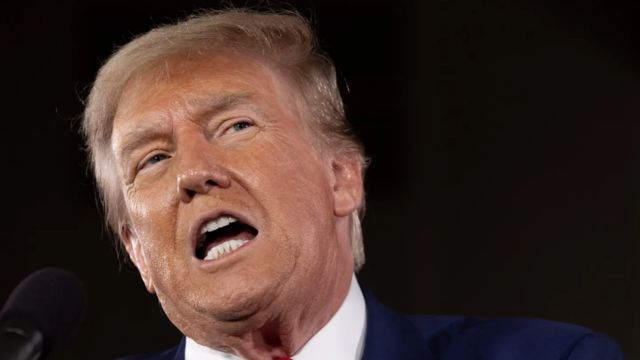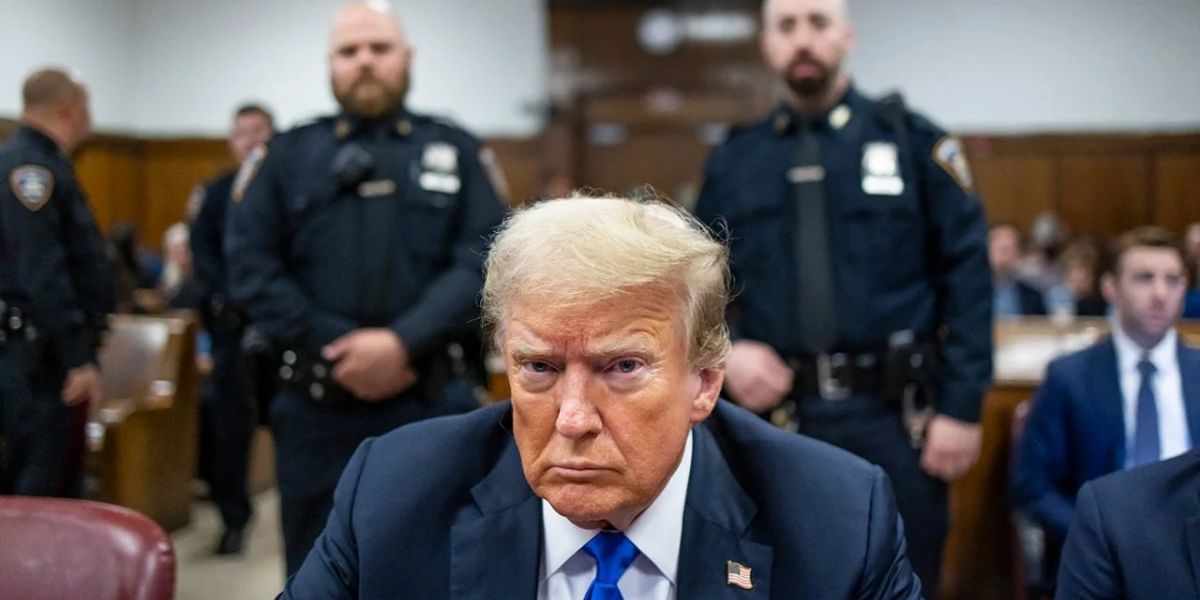WFCN – Senate Republicans are advising New York Judge Juan Merchan not to impose any conditions on the former president Trump, such as home detention or prison terms, or to take any other action that would make it more difficult for the presumptive GOP nominee to run for office in November.
Trump’s appeal of his conviction on 34 felony counts involving the falsification of company paperwork might take months, and legal experts don’t anticipate that the conservative-leaning U.S. Supreme Court will step in to support him.
Thus, Merchan has the final say over Trump’s destiny and can sentence him to anything from community service and probation to jail time and house arrest.
On July 11, four days prior to the Republican National Convention in Milwaukee, Merchan—who has received positive feedback from legal experts for his meticulous handling of the case—will sentence Trump.
Republican senators agree that, according to legal experts, it would be extremely improbable that Trump would be sentenced to prison for a class E felony and that, instead, he would probably be permitted to stay out of jail while he filed an appeal with higher state courts.
However, they are anxious about what might occur because Merchan has significant discretion in sentencing decisions and they believe he skewed the trial against Trump’s legal team.

Senior member of the Senate Judiciary Committee Sen. John Cornyn (R-Texas) declared that imprisoning or confining Trump at home would be a “further abuse of power.”
He declared, “I’m very troubled by what I see in the weaponization of the courts.” “Unfortunately, that has changed, and not for the better. There were some American institutions, like the FBI, the Department of Justice, and the courts, that were formerly thought to be off limits for overt partisan politics.”
SEE MORE – Broken Promises to Florida’s Seniors: The True Impact of the Inflation Reduction Act
The faith that people have in the fairness of the 2024 election might be severely damaged, according to Republican senators, by any measure that would restrict Trump’s movement or communication with the electorate.
Legal experts anticipate that Merchan won’t imprison Trump prior to the convention, but several Republican lawmakers are concerned about the possibility of that outcome in light of what they have seen thus far in the case and trial.
Sen. Ted Budd (R-N.C.) stated that sending Trump to jail or house detention would be “foolish.”
“But it’s completely unfair, it’s unconstitutional, and I would put anything past him at this point when you see the conviction and the rules that he instructed the jury with,” he said of Merchan.
A harsh punishment, according to Budd, “would only strengthen the resolve of the Americans to support President Trump.”
Sen. Thom Tillis (R-N.C.), a member of the Judiciary Committee, is uncertain about the possibility that the likely GOP nominee for president ends up in jail before Election Day. Tillis had been certain that the Manhattan jury would not find Trump guilty.
“Anything is possible with this process,” he declared.
According to Tillis, if the judge limits Trump’s capacity to campaign, he will have to demonstrate that the punishment does not differ from that of other defendants found guilty of the same or comparable offenses.
District Attorney Alvin Bragg’s request for jail time, he added, “just adds more fuel to the fire that it was his politically motivated decision until they can pretty quickly find examples of where similar cases have resulted in prison time.”
SEE MORE –
Texas Prosecutor Moves to Overturn Governor’s Pardon of Convicted BLM Protester Murderer
The majority of legal experts believe the judge could not sentence Trump to more than 20 years in prison. Trump was found guilty on 34 counts of fabricating company documents, a class E felony. He faces up to four years in prison on each count.
The goal of Trump’s legal team would be to postpone any punishment until after he has finished his appeals, which would probably take some time until Election Day.
According to Norm Eisen’s analysis, a senior scholar in governance studies at the Brookings Institution, only one out of every ten first-degree business record falsification instances in New York ended in an arrest. The New York Times was the first to publish his findings.
However, Merchan, the judge, has a reputation for being harsh on white-collar criminals, as several legal experts in New York point out.
Over the weekend, Trump acknowledged that “it could happen” and issued a warning that if he were imprisoned or kept inside his house, the public would reach a “breaking point.”
He remarked, “It would be difficult for the public to accept.”
According to Tills, Trump might benefit politically from a harsh sentence since it would infuriate his fans even more.
Regarding his imprisonment, he remarked, “Nowadays it looks like he truly is being treated in a punitive way by the courts.” “It would seriously damage the credibility of the case being filed in the first place.”
SEE MORE –
A few Republican senators have forecasted that the Supreme Court will reverse any convictions Trump may have received for crimes.
Sen. Rand Paul (R-Ky.) declared last month, “I think the Supreme Court will ultimately reverse everything.” “I believe that many of these cases will eventually come before the Supreme Court, which will declare that we are not a banana republic.”
A member of the Judiciary Committee, Sen. Ted Cruz (R-Texas), stated last year that “a reversal at the U.S. Supreme Court would be the ultimate outcome of any Donald Trump conviction on this indictment.”
Legal experts, however, argue that since Trump’s conviction raises no overt constitutional issues, they do not anticipate the nation’s top court to become involved in a state criminal case.
Constitutional law expert and George Mason University law professor Ilya Somin stated, “The most likely answer is the Supreme Court is going to do nothing.”
“A case like this cannot be sent straight from a state trial court to the federal Supreme Court without following certain procedures. There simply isn’t,” he remarked. “At least not now, there doesn’t seem to be a federal law issue here. Attempting to formulate one presents an additional challenge to bringing it before the Supreme Court altogether.
“It is my belief that the federal Supreme Court will not take any action until the matter reaches the New York state supreme court or any other higher court in New York that has the authority to render a decision,” he stated.
There is no possibility that the United States Supreme Court will intervene to overturn Trump’s conviction or avert a prison sentence before the election, according to Barbara McQuade, a criminal law and procedure expert and law professor at the University of Michigan.
The likelihood of the US Supreme Court getting involved in Donald Trump’s conviction before the election is nil, in my opinion. It will take him more than a year to exhaust his appeals in the state court system in New York, she said.
She stated, “Even then, the case would only come before the Supreme Court if there was a question involving federal statute or constitutional law.”
However, a few senators who are Republicans argue that the US Supreme Court must intervene before to election day.
Regarding the public’s reaction to Trump’s imprisonment, National Republican Senatorial Committee Chair Steve Daines (R-Mont.) remarked, “It would be unprecedented, but look at the response we’ve seen already with the conviction, with fundraising numbers we’ve never seen before.”
“We shouldn’t allow a kangaroo court in New York to be interfering in this election,” Daines stated in response to a question regarding the role of the US Supreme Court.
“The American people ought to be the judges,” he declared.
Former Judiciary Committee chair Sen. Chuck Grassley (R-Iowa) stated that while the Supreme Court doesn’t now need to get involved in Trump’s criminal case, it might in the event that the appeals process drags on past the election.
Regarding whether the conviction warrants a review by the US Supreme Court, he responded, “Not at this time.” “I think there might be a reason for the Supreme Court to step in if other appeal processes are bogged down and it could go beyond the election to get an answer on whether this is a fair or not.”
Grassley stated that as this is Trump’s first criminal conviction, “everyone I’ve heard talk about it” believes a prison term is extremely unlikely.
However, if Trump were imprisoned on Rikers Island, he believes he could still win the election.
If he was incarcerated, “it would probably help him get reelected,” he remarked.
